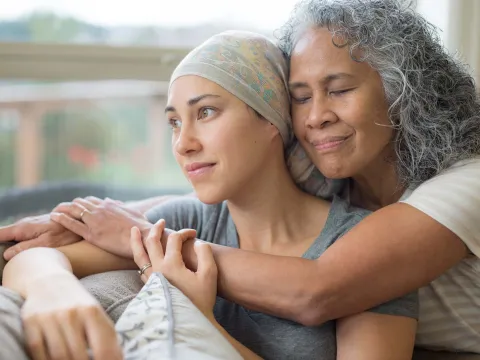- AdventHealth Hendersonville

Choose the health content that’s right for you, and get it delivered right in your inbox.
According to new information released in December 2020 by the International Agency for Research on Cancer (IARC), breast cancer has now overtaken lung cancer as the world’s most commonly diagnosed cancer, accounting for 12% of all new annual cancer cases worldwide.
It’s also now the most commonly diagnosed cancer among American women. In 2021, it’s estimated that over 280,000 new cases of invasive breast cancer will be diagnosed in U.S. women, along with nearly 50,000 new cases of non-invasive breast cancer.
Why Are Breast Cancer Cases Rising?
The World Health Organization (WHO) suggests that around one-third of deaths from cancer are due to:
- Alcohol consumption
- High body mass index
- Lack of physical activity
- Low fruit and vegetable intake
- Tobacco use
WHO also attributes the rise in breast cancer diagnoses in the last year to the COVID-19 pandemic. With many women choosing to postpone annual visits or delay ongoing treatment for existing health concerns, doctors are seeing more late-stage diagnoses as patients return for appointments.
While some cancers don’t have screening tests available, breast cancer does — and has a high chance of being curable if diagnosed early and treated effectively.
Better Imaging and Treatments Are Improving Survival Rates
Some good news is that even though the number of diagnosed breast cancer cases is rising, women with aggressive breast cancer are living longer due to better imaging techniques, which help detect breast cancer earlier, and improved treatments .
The five-year survival rate for women diagnosed with metastatic breast cancer before age 50 has doubled since the 1990s, from 18% to 36%.
When we look at the changing statistics and data, it’s important to note that people in the U.S. are living longer. That means that there are more older women overall and therefore more women being diagnosed with breast cancer.
Screening Is Still the Best Way to Reduce Your Risk
Breast cancer screening is the best way to find breast cancer early, before it spreads. Screenings are for healthy adults with no symptoms. The goal is to find cancer before you feel a lump or notice other symptoms, such as:
- Breast pain
- Changes in breast shape or size
- Dimpling, puckering or bulging of the skin
- Inverted nipple (pushed inward rather than sticking out)
- Lumps or thickening in the breast or underarm
- Nipple discharge (other than breast milk)
- Redness, soreness, rash or swelling
We recommend that most women receive mammograms every two years starting at age 40. Some may need earlier or more frequent screening — for example, if you have a family history of breast cancer, carry a certain genetic mutation or received radiation therapy to your chest when you were younger.
Talk with your doctor about the screening schedule that would be best for you.
HEALing After Diagnosis
If you’ve been diagnosed with breast cancer recently and are working toward recovery, you’re invited to join our Healthy Eating and Active Lifestyle (HEAL) Breast Cancer Program. HEAL is a wellness program based on the principles of lifestyle medicine, including plant-based nutrition, physical activity and mindfulness. Dr. Amber Orman, AdventHealth Cancer Institute ’s radiation oncologist, leads these 90-minute sessions virtually via Zoom on Fridays.
HEAL is an 8-week program that helps educate on reducing the risk of cancer recurrence and strategies on how to make manageable lifestyle changes. The program is typically covered by insurance, and Dr. Orman’s office is happy to assist with coordinating any questions related to cost and coverage.
To learn more about HEAL, visit AdventHealthCancerInstitute.com/HEALBreast .
Partnering With You to Reduce Your Breast Cancer Risk
AdventHealth offers women the peace of mind that comes with knowing you’re doing everything you can to spot breast cancer early. And even if cancer is found, AdventHealth has the latest therapy to help you manage your diagnosis. To learn more or to connect with our cancer care team, click here .



